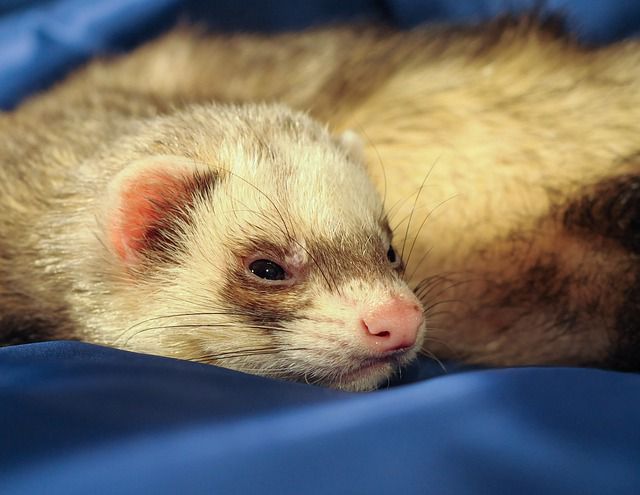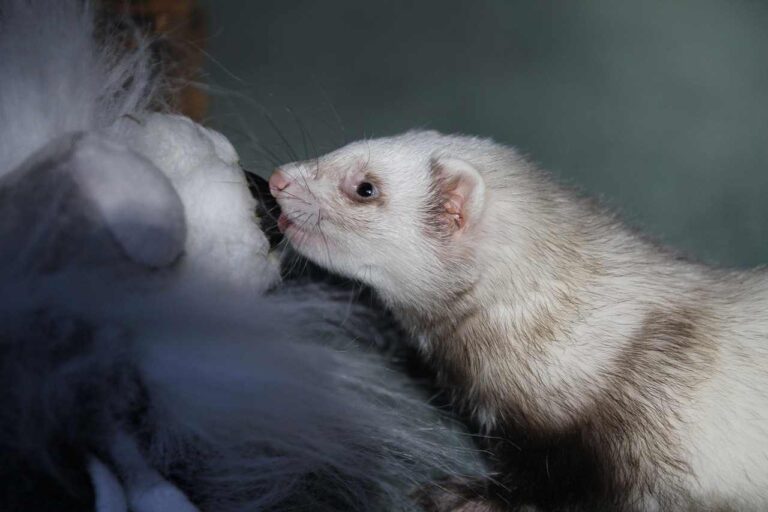11 Common Signs Of A Sick Ferret With Helpful Tips

Let’s discuss the signs of a sick ferret… Have you ever noticed some unusual behavior in your ferret and wondered if something might be wrong?
Well, in this blog post, we’ll dive into the telltale signs that your furry friend might be feeling under the weather.
From changes in appetite to lethargy, we’ve got you covered with all the red flags to watch out for.
Let’s get started…
Common Signs Of A Sick Ferret
Signs of a sick ferret can include loss of appetite, weight loss, lethargy, diarrhea, vomiting, and difficulty breathing.
If you notice any of these signs, it’s important to seek veterinary care promptly to ensure the health and well-being of your ferret.
Let’s dive deeper…
The following are some common signs of a sick ferret:
1. Vomiting and Diarrhea
Vomiting and diarrhea are common signs that your ferret may be sick. These symptoms can be caused by various factors, including dietary changes, gastrointestinal infections, parasites, or even a more serious underlying health condition.
If your ferret is experiencing vomiting and diarrhea, it is essential to monitor their behavior and seek veterinary care if the symptoms persist or worsen. In the meantime, you can try withholding food for a few hours to give their stomach a rest but always provide access to fresh water.
If the symptoms continue, it is crucial to consult a veterinarian who can diagnose the cause and provide appropriate treatment, which may include medication to alleviate symptoms, dietary adjustments, or further medical intervention.
2. Rapid Weight Loss and Lethargy
Rapid weight loss in a ferret is a concerning sign of an underlying health issue. There are several possible causes for this, including gastrointestinal problems, dental issues, parasites, or even cancer. If you notice your ferret losing weight rapidly, it is important to seek veterinary attention promptly.
To address this issue, the first step is to schedule a visit with a ferret-savvy veterinarian. They will conduct a thorough examination and may recommend additional tests, such as blood work or imaging, to determine the underlying cause. Treatment will depend on the specific diagnosis, but options may include medication, dietary changes, or surgery.
In the meantime, it is crucial to monitor your ferret’s food and water intake, as well as their overall behavior. Encourage them to eat by offering highly palatable foods and ensuring a quiet and stress-free environment. Providing proper nutrition and a balanced diet is essential for their overall well-being.
Remember, rapid weight loss in a ferret should never be ignored. Early intervention and proper veterinary care are vital to identify and address any underlying health issues, ensuring the best possible outcome for your beloved pet.
3. Changes in Appetite
Changes in appetite are a concerning sign that your ferret may be sick. There are several possible causes for a decreased or increased appetite in ferrets. It could be due to a gastrointestinal issue, dental problems, stress, or an underlying medical condition.
If you notice a change in your ferret’s appetite, it is important to monitor their behavior and consult with a veterinarian. They can conduct a thorough examination and diagnostic tests to determine the cause.
Treatment will depend on the underlying cause. In some cases, dietary adjustments or medication may be necessary. It is crucial to follow the veterinarian’s advice and provide the necessary care to ensure your ferret’s well-being. Regular check-ups and a balanced diet can help maintain a healthy appetite in ferrets.
4. Coughing and Sneezing
Coughing and sneezing in ferrets is a sign of respiratory illness. The possible causes of these symptoms include infections, allergies, or irritants in the environment.
If your ferret is coughing or sneezing, it is important to monitor their overall health and behavior. Seek veterinary assistance if the symptoms persist or worsen.
To address these symptoms, ensure that your ferret’s living environment is clean and free from potential irritants. Avoid exposing them to smoke, strong odors, or dusty areas. Keep their bedding clean and provide proper ventilation.
If the symptoms persist, a vet may recommend diagnostic tests such as blood work or X-rays. Treatment options may include antibiotics, antihistamines, or other medications depending on the underlying cause. Always follow your vet’s advice and complete the prescribed treatment course.
5. Eye and Nose Discharge
Eye and nose discharge in ferrets is a sign of illness and should not be ignored. There are several possible causes for this symptom, including respiratory infections, allergies, or even blockages in the tear ducts.
If you notice your ferret has eye or nose discharge, it’s important to take them to a veterinarian for a proper diagnosis. The vet may perform tests, such as a physical examination or swabs, to determine the underlying cause.
Treatment options will depend on the specific diagnosis but may include antibiotics, antihistamines, or surgery to clear any blockages. Prompt veterinary care is crucial to ensure your ferret’s health and well-being.
6. Difficulty Breathing
Difficulty breathing in ferrets is a concerning sign of illness. There are several possible causes for this symptom, including respiratory infections, heart disease, or even foreign objects obstructing the airway. If you notice your ferret struggling to breathe, it’s important to seek veterinary care immediately.
The veterinarian will perform a thorough examination to determine the underlying cause of the breathing difficulty. Depending on the diagnosis, treatment options may include antibiotics for infections, medications to manage heart conditions or surgical removal of obstructions.
In the meantime, you can provide a calm and stress-free environment for your ferret. Keep their living area clean and free of irritants, such as dust or strong odors. Avoid exposing them to extreme temperatures or smoking, as these can worsen respiratory symptoms.
Remember, prompt veterinary attention is crucial when it comes to difficulty breathing in ferrets. By seeking professional help and following the prescribed treatment plan, you can help your furry friend recover and breathe easier.
7. Limping or Lameness

Limping or lameness in a ferret is a concerning sign of illness. There are several possible causes for this symptom, including injuries, arthritis, infections, and bone disorders. If your ferret is limping, it’s important to observe if there are any visible wounds or swelling.
If there are, gently clean the area with mild antiseptic and seek veterinary care if necessary. If no external signs are present, it’s advisable to take your ferret to a veterinarian for a proper diagnosis.
Treatment for limping in ferrets depends on the underlying cause and may include pain medication, antibiotics, physical therapy, or surgery, if necessary.
8. Dull or Scruffy Coat
A dull or scruffy coat in a ferret is a sign that the animal is unwell. This condition is often caused by nutritional deficiencies, poor grooming habits, or underlying health issues.
To address this, it is crucial to ensure that the ferret’s diet is balanced and provides all the necessary nutrients. Regular grooming, including brushing and bathing, can also help maintain a healthy coat.
If the issue persists, it is advisable to consult a veterinarian for a thorough examination and diagnosis. Treatment may involve dietary adjustments, supplements, or medications, depending on the underlying cause of the coat’s dullness or scruffiness.
9. Strange Odors
Strange odors can be a sign that your ferret is sick. One possible cause of unusual smells is a condition called adrenal disease, which affects the adrenal glands. Other potential causes include dental problems or gastrointestinal issues.
If you notice a strange odor coming from your ferret, it’s important to take them to a veterinarian for a proper diagnosis. The veterinarian will perform a physical examination and may recommend further tests like blood work or imaging.
Treatment options will depend on the underlying cause and may include surgery, medications, or changes in diet and hygiene. Prompt veterinary attention is crucial to ensure your ferret’s health and well-being.
10. Frequent Scratching
Frequent scratching in ferrets is a sign of underlying health issues. It is essential to identify the possible causes and take appropriate action. One common cause of scratching in ferrets is flea or mite infestation.
A thorough examination of the fur and skin can help determine if this is the case. If fleas or mites are present, treatment with appropriate insecticides may be necessary.
Another possible cause of scratching is dry skin, which can be alleviated by providing a humid environment and using moisturizing products specifically formulated for ferrets.
Furthermore, allergies, such as food or environmental allergies, can also lead to scratching. Identifying and eliminating the allergen from the ferret’s environment or diet can bring relief.
In any case, if frequent scratching persists or is accompanied by other concerning symptoms, it is recommended to consult a veterinarian for a proper diagnosis and treatment plan.
11. Sudden Changes in Behavior
Behavioral changes such as lethargy, tiredness, or withdrawal in a ferret can indicate illness. These signs could be caused by a variety of factors, including infections, gastrointestinal issues, or even underlying diseases. If you notice these changes in your ferret, it is important to consult a veterinarian for a proper diagnosis.
To address lethargy and tiredness in a ferret, ensure they have a comfortable and quiet environment to rest. Offer them fresh water and a balanced diet to support their recovery. If necessary, encourage gentle exercise and playtime to stimulate their energy levels.
Treatment will depend on the underlying cause of the behavioral changes. The veterinarian may prescribe medication, recommend a change in diet, or suggest additional tests to identify the root cause. It is crucial to follow the veterinarian’s advice and administer any prescribed treatments as instructed.
Read more about health problems in ferrets.
Ways of Caring for a Sick Ferret at Home

Caring for a sick ferret at home requires careful attention and proper care. Here are some common ways to care for a sick ferret:
- Isolation and Quarantine: If you notice that your ferret is sick, it’s important to isolate them from other ferrets to prevent the spread of any potential infections. Create a separate space for the sick ferret to recover and minimize contact with other animals.
- Provide a Comfortable Environment: Ensure that the sick ferret has a warm, quiet, and comfortable environment to rest and recover. Ferrets prefer temperatures between 65-75°F (18-24°C). Provide them with a cozy bedding area and a hiding spot.
- Hydration: Sick ferrets may become dehydrated, so it’s important to encourage them to drink water. Offer fresh water at all times and consider using a water bottle attached to the cage to make it easily accessible.
- Appetite Stimulation: A sick ferret may lose its appetite. Offer tempting and easily digestible food options such as canned kitten food or baby food (without onion or garlic). Warm the food slightly to enhance the aroma and encourage eating.
- Medication Administration: If prescribed by a veterinarian, administer any medications as directed. Follow the recommended dosage and ensure that the ferret takes the full course of medication.
- Gentle Handling: Sick ferrets may be weak or in pain, so handle them gently and provide support when necessary. Avoid any rough play or stressful situations that could further compromise their health.
- Monitor Symptoms: Keep a close eye on the ferret’s symptoms and behavior. Monitor their eating, drinking, and elimination habits. Note any changes in behavior, such as lethargy, difficulty breathing, or abnormal discharge.
- Maintain Cleanliness: Regularly clean the ferret’s cage and bedding to prevent the buildup of bacteria or odors. Use ferret-safe cleaning products and ensure proper ventilation in the area.
- Consult a Veterinarian: If your ferret’s condition worsens or does not improve, it is important to seek veterinary care. A veterinarian experienced in ferret care will be able to provide a proper diagnosis and recommend appropriate treatment options.
Remember, these are general guidelines, and it’s crucial to consult with a veterinarian for specific advice tailored to your ferret’s health condition. Ferrets are unique animals with specific needs, so professional guidance is essential for their well-being.
Frequently Asked Questions
How can I tell if my ferret is sick?
There are a few signs to look out for if you suspect your ferret is unwell. Keep an eye on changes in their behavior, such as decreased appetite, lethargy, or unusual aggression. Additionally, pay attention to any changes in their appearance, like a dull coat, discharge from the eyes or nose, or difficulty breathing.
What should I do if I notice these signs in my ferret?
If you notice any concerning signs in your ferret, it’s important to consult a veterinarian who specializes in exotic pets. They will be able to conduct a thorough examination and provide the necessary treatment or advice. Remember, early detection and intervention can make a big difference in your ferret’s health.
Are there any other signs I should be aware of?
Yes, there are a few other common signs of illness in ferrets. These include weight loss, diarrhea, vomiting, excessive itching or scratching, and difficulty urinating. It’s always best to trust your instincts and seek professional help if you’re unsure about your ferret’s health.
Can ferrets get colds or respiratory infections?
Yes, ferrets are prone to respiratory infections, including the common cold. If your ferret is sneezing, coughing, or has a runny nose, it could be a sign of a respiratory issue. It’s important to seek veterinary care as soon as possible to prevent the infection from worsening.
Can ferrets hide their illnesses?
Yes, ferrets are known for their ability to hide signs of illness. In the wild, showing vulnerability can make them more susceptible to predators. As pet owners, it’s essential to closely monitor our ferrets’ behavior and seek professional help if we suspect anything is wrong, even if they appear to be acting fine.
Are there any preventive measures I can take to keep my ferret healthy?
Absolutely! Regular veterinary check-ups, a balanced diet, and a clean living environment are key to maintaining your ferret’s health. Additionally, make sure they receive all necessary vaccinations and keep up with parasite prevention. Providing mental and physical stimulation through playtime and social interaction can also contribute to their overall well-being.
Conclusion
In conclusion, keeping a close eye on your ferret’s behavior, appetite, and overall health is crucial in spotting signs of illness early on.
Remember, a sick ferret may display symptoms such as lethargy, loss of appetite, and changes in bathroom habits.
By monitoring these signs and seeking veterinary care when needed, you can ensure your furry friend stays happy and healthy for years to come.




![Ferret Depression [Signs, Causes & Solutions] Ferret Depression](https://petcreeks.com/wp-content/uploads/2023/12/ferret-2194028_1280-768x510.jpg)

